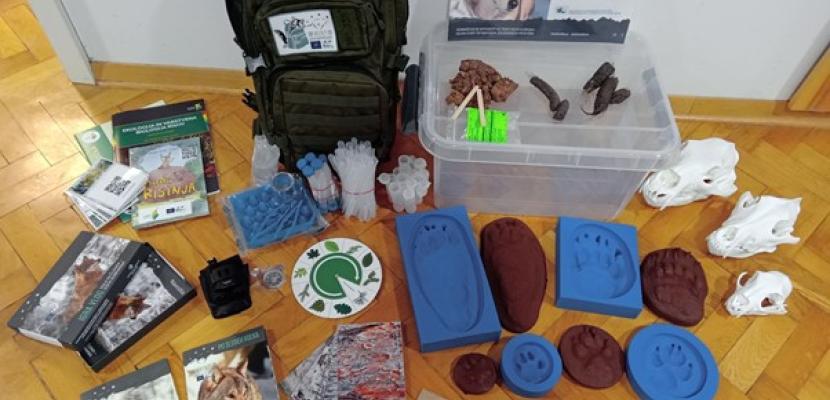
Involving School Children in Coexistence with Large Carnivores

About this good practice
The conservation and management of large carnivores (LC) depends on structural, technological and cognitive aspects. While legal frameworks for species protection and conflict prevention are crucial, the cognitive aspect plays a long-term role in shaping perceptions and behaviour. Education is key to achieving this. Previous research has shown that hands-on work with biological materials and replicas effectively engages students. Visits to LC habitats also increase interest in learning. These approaches were implemented in the EU LIFE WOLFALPS project, where we developed the “Wolf in a Backpack” toolkit to support educators. The original idea came from MUSE, and we at the SFS adapted it to Slovenian needs in 2023. It was later implemented and used by other institutions as goodpractice in 2024. The kit contains replicas of biological materials, e.g. skulls, footprints and scats and learning activities (e.g. role-play activity developed by LWA EU project enables players to step into the shoes of different stakeholders (SH), including decision-makers) about LC, their habitats and coexistence. Teachers' guides and books produced by the LIFE Lynx project have also been added. Given the emphasis on experiential learning, cooperation with informal educational institutions such as national parks, carnivore centres and zoos is a great opportunity. They all were trained how to use the educational kit and promote it among schools and also wider audiences.
Resources needed
In the LIFE Wolf Alps project, we created 10 toolkits (≈1,500 EUR each). To ensure sustainability, 200 staff hours were used for guidelines, training, and dissemination. Reproduction costs: 1,500–2,000 EUR + 2–5 days for training and translation, plus 5 days for local adaptation if needed.
Evidence of success
This good practice effectively engaged students and educators through hands-on experiences, habitat visits, role-playing activities, and stakeholder involvement in learning. Methods were tested on over 1,000 schoolchildren, and the best were included in the toolkit. Evaluation showed role-playing activities and stakeholder input increased knowledge and improved attitudes toward the wolf, supporting integration into regular educational practice across various institutions.
Potential for learning or transfer
The "Wolf in a Backpack" toolkit is a thoughtfully designed collection of educational resources aimed at schoolchildren—our future decision-makers. It supports educators in delivering accurate and engaging information about large carnivores through experiential learning and hands-on activities. These tools help foster positive attitudes toward nature conservation and encourage children to explore different perspectives on complex issues through methods such as role-playing and group discussions, not only for large carnivores, but can be a model learning approach for various environmental issues and also applicable for wider public in communication activities that support conservation and management efforts. As society becomes increasingly polarized—especially around contentious topics like large carnivores—resources like the "Wolf in a Backpack" make it easier for educators to communicate nuanced knowledge and promote constructive dialogue among students.

